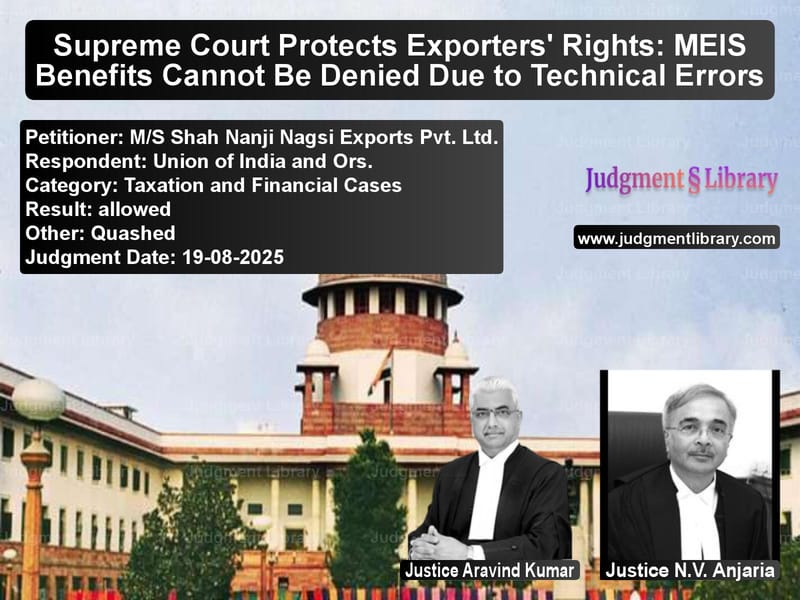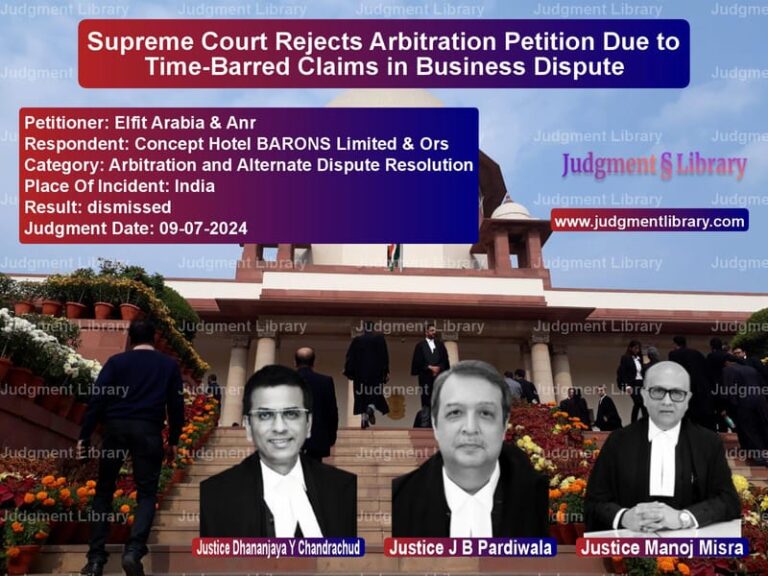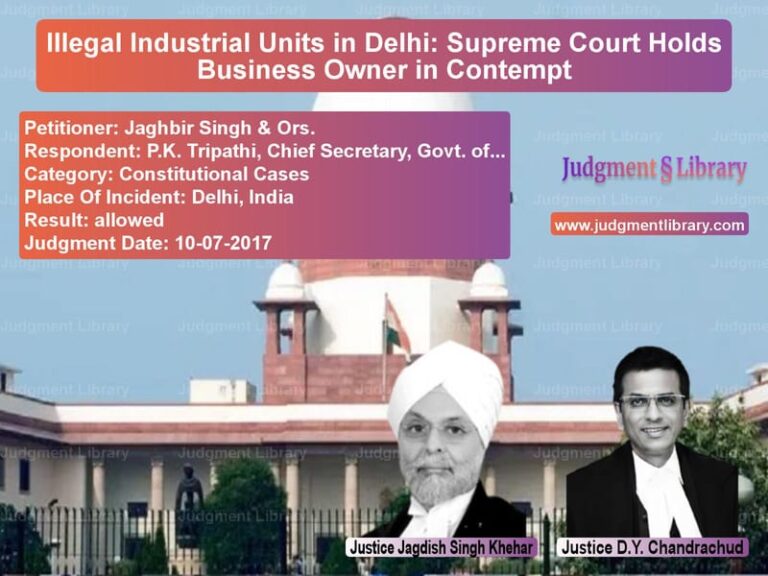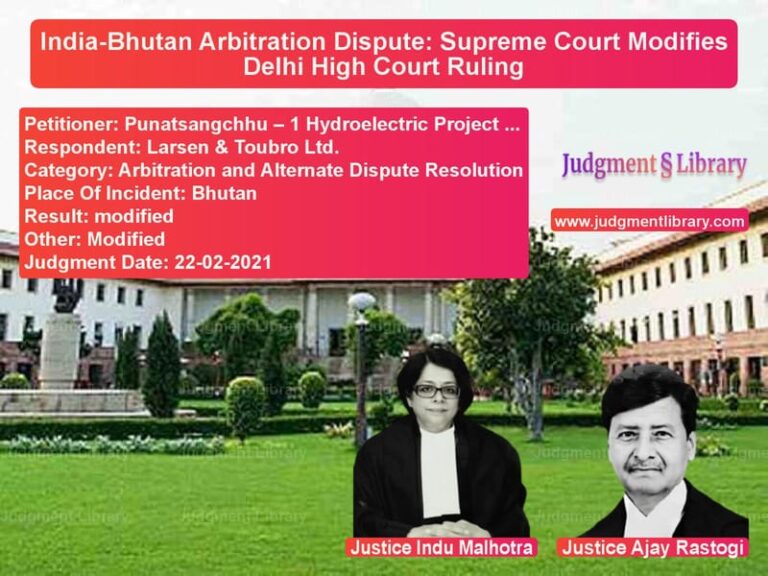Supreme Court Protects Exporters’ Rights: MEIS Benefits Cannot Be Denied Due to Technical Errors
In a significant victory for Indian exporters, the Supreme Court has delivered a landmark judgment protecting businesses from losing their legitimate export incentives due to minor technical errors in documentation. The case involved a company that stood to lose substantial export benefits because of a simple clerical mistake made by their customs broker while filing shipping bills electronically. This ruling reinforces the principle that substantive rights cannot be defeated by procedural technicalities, especially when those technicalities have been legally corrected.
The story begins with M/s Shah Nanji Nagsi Exports Pvt. Ltd., a company engaged in the export of corn starch. Between July 22, 2017, and October 5, 2017, the company effected 54 shipping bills under the Foreign Trade Policy 2015-20, making them eligible for incentives under the Merchandise Exports from India Scheme (MEIS). This scheme, contained in Chapter 3 of the Policy, was designed to reward exporters and boost India’s export performance.
However, a seemingly minor error threatened to derail the company’s entire claim. When filing the shipping bills electronically on the ICEGATE platform through their customs broker, the default entry “No” in the column requiring declaration of intent to claim reward was not changed to “Yes.” This inadvertent omission, though purely clerical in nature, had serious consequences – it prevented the shipping bills from being transmitted to the repository of the Directorate General of Foreign Trade (DGFT), making it impossible for the company’s MEIS reward claim to be processed electronically.
Upon discovering this error, the company took prompt corrective action. They addressed a representation to the Regional Authority of DGFT on March 13, 2018, and simultaneously applied before the Deputy Commissioner of Customs, Mundra, invoking Section 149 of the Customs Act, 1962. This provision allows for amendment of shipping bills under certain circumstances. On June 8, 2018, the Deputy Commissioner allowed the amendment of all shipping bills, formally substituting the declaration “No” with “Yes.” This correction was legally sanctioned and not disputed by any party.
Despite this legal correction, when the company pursued the matter with DGFT, they hit a technological wall. The authorities informed them that the system permitted no manual intervention and that unless the shipping bills were originally transmitted with the entry “Yes,” they could not be processed. This rigid technological constraint threatened to nullify the legal correction that had been properly made under the Customs Act.
The company was then compelled to approach the Policy Relaxation Committee on December 5, 2018. However, the PRC rejected the claim through a cryptic email dated March 15, 2019, stating merely that “no merit or hardship was made out.” No reasons were assigned for this decision, nor was the company afforded an opportunity of being heard, raising serious questions about procedural fairness.
Aggrieved by this rejection, the company approached the Nagpur Bench of the Bombay High Court through Writ Petition No. 4095 of 2019. During the pendency of this petition, a Division Bench of the Bombay High Court delivered a judgment in Portescap India Private Limited v. Union of India & Others on March 2, 2021, dealing with an identical issue. The company brought this favorable judgment to the court’s notice through a pursis. Despite this, the High Court dismissed their writ petition on August 2, 2021, taking the view that the error was attributable to the customs broker and that the company could pursue remedies against the broker but no relief could be granted in exercise of writ jurisdiction.
The matter then reached the Supreme Court, where both parties presented their arguments. Learned counsel for the appellant submitted that the exports were genuine, covered under the notified products in Appendix 3B, and that the intention to claim MEIS was evident from the invoices. It was urged that once the Customs authority had corrected the shipping bills under Section 149, the bills stood regularised in law and were required to be acted upon. Further it was contended that the rejection by the PRC was arbitrary and violative of the principles of natural justice as no reasons were assigned nor hearing granted. Further it was submitted that the High Court, erred in relegating the appellant to pursue remedies against the broker, when the entitlement arose under the statutory scheme. Reliance was placed upon Portescap India Private Limited (supra), which had attained finality.
Per contra, learned Additional Solicitor General appearing for the respondents submitted that the FTP and Handbook of Procedures required a declaration of intent to be made on the shipping bill at the time of export. Unless “Yes” was so marked, the DGFT system could not accept the claim or process the claim, and no manual over-writing was permissible. It was urged that MEIS is a policy incentive, and strict compliance with procedure is mandatory. The PRC, being the competent authority, considered the matter and rejected it. The High Court was, therefore, correct in declining to grant relief.
The Supreme Court, comprising Justices Aravind Kumar and N.V. Anjaria, framed the principal question for consideration: whether an inadvertent error in the shipping bills, which was permitted to be corrected under Section 149 of the Customs Act, can defeat an exporter’s claim under the MEIS?
The court examined a consistent line of decisions from the Bombay High Court that had dealt with similar situations. In Portescap India Private Limited, the Bombay High Court had dealt with a similar situation where an exporter had inadvertently marked “N” (for No) instead of “Y” (for Yes) while filing shipping bills. The High Court held that such a mistake was purely procedural and, once corrected, could not extinguish substantive entitlement. The Court directed the authorities to process the claim, emphasising that the purpose of Chapter 3 of the FTP is to incentivise exports and that this object would be frustrated if inadvertent mistakes were treated as insurmountable. The ratio of Portescap (supra) is squarely applicable to the present case.
The principle was reiterated in Technocraft Industries (India) Limited v. Union of India and Others, where the Bombay High Court again considered denial of MEIS benefits despite the shipping bills having been corrected under Section 149. The High Court noted the hardship faced by exporters and directed the Customs and DGFT authorities to take appropriate steps to prevent recurrence of such disputes, observing that systemic rigidity cannot be allowed to defeat substantive rights. The facts of the present case furnish an illustration of the very mischief which Technocraft (supra) sought to remedy.
In Larsen and Toubro Limited v. Union of India and Others, the Bombay High Court dealt with a similar rejection of MEIS claims despite amendment under Section 149. The High Court deprecated the rejection, holding that technical or systemic constraints cannot override statutory entitlements.
The Supreme Court analyzed these precedents and observed: These decisions, read together, demonstrate a consistent judicial approach that distinguishes between procedural formalities and substantive entitlements. The scheme under Chapter 3 of the FTP is a beneficial one, intended to reward exporters. Once exports are genuine and fall within the notified category, inadvertent mistakes of procedure cannot be treated as fatal, especially where they are corrected under statutory authority. The rejection by the PRC, bereft of reasons and passed without hearing, falls foul of the principles of natural justice. The High Court’s view that the appellant may proceed against the customs broker fails to address the statutory entitlement which accrues to the exporter under the scheme. Administrative technology must aid, not obstruct, the implementation of the law.
In light of this analysis, the Supreme Court allowed the appeal and set aside the judgment of the High Court. The rejection by the Policy Relaxation Committee was quashed, and the respondents were directed to process the appellant’s claim for MEIS benefit on the basis of the amended shipping bills and to pass appropriate orders in accordance with law within twelve weeks.
The court also made an important observation about systemic reforms: While we refrain from imposing costs, we cannot but observe that the recurrence of such disputes, despite authoritative pronouncements in Portescap, Technocraft Industries and Larsen and Toubro Limited, underscores the need for systemic correction. The Union of India, acting through the Directorate General of Foreign Trade and the Central Board of Indirect Taxes and Customs, must take appropriate measures, whether by issuing comprehensive instructions or by suitable technological adjustments, to ensure that genuine exporters are not driven to needless litigation on account of inadvertent procedural lapses which have been rectified in accordance with law.
This judgment serves as an important reminder that while procedures are important for orderly administration, they should not become tools to deny substantive rights. The court’s emphasis that “administrative technology must aid, not obstruct, the implementation of the law” is particularly relevant in today’s digital age where technological systems often impose rigid constraints that may conflict with legal principles and fairness. The ruling protects exporters from losing legitimate benefits due to minor errors and reinforces the principle that when procedural mistakes are legally corrected, they should not be used to defeat substantive entitlements.
Petitioner Name: M/S Shah Nanji Nagsi Exports Pvt. Ltd..Respondent Name: Union of India and Ors..Judgment By: Justice Aravind Kumar, Justice N.V. Anjaria.Judgment Date: 19-08-2025.Result: allowed.
Don’t miss out on the full details! Download the complete judgment in PDF format below and gain valuable insights instantly!
Download Judgment: ms-shah-nanji-nagsi-vs-union-of-india-and-o-supreme-court-of-india-judgment-dated-19-08-2025.pdf
Directly Download Judgment: Directly download this Judgment
See all petitions in Customs and Excise
See all petitions in Tax Refund Disputes
See all petitions in Corporate Compliance
See all petitions in Contract Disputes
See all petitions in Judgment by Aravind Kumar
See all petitions in Judgment by N.V. Anjaria
See all petitions in allowed
See all petitions in Quashed
See all petitions in supreme court of India judgments August 2025
See all petitions in 2025 judgments
See all posts in Taxation and Financial Cases Category
See all allowed petitions in Taxation and Financial Cases Category
See all Dismissed petitions in Taxation and Financial Cases Category
See all partially allowed petitions in Taxation and Financial Cases Category







